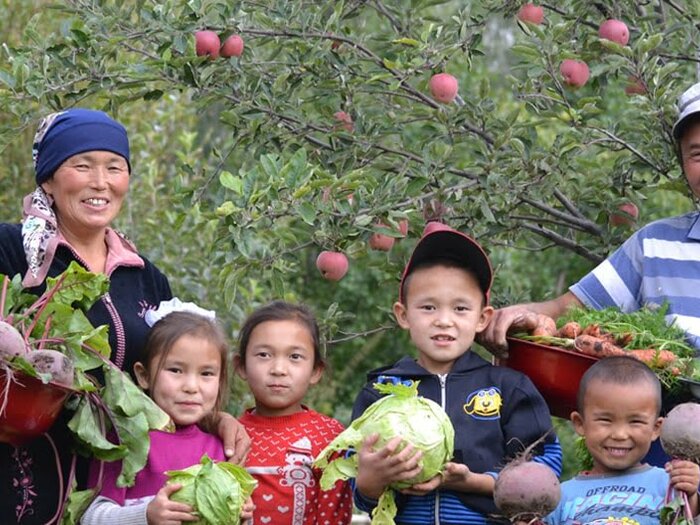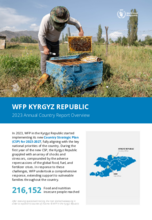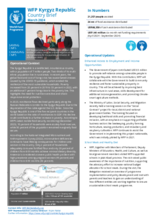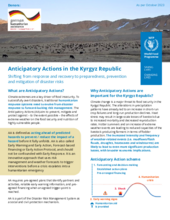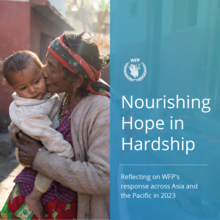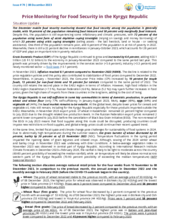Kyrgyz Republic
- 1/3
- of people live on less than US$1.3 a day
- 70%
- of the poorest families live in remote rural areas
- 6.6 million
- population
Despite the economic and human development progress experienced over the past decade, Kyrgyzstan still faces significant challenges in the pursuit of Sustainable Development Goal 2 on Zero Hunger and improved nutrition.
About one fifth of the population (20.1 percent) – or 1.2 million people – live on less than US$1.3 a day. Although they spend up over 60 percent of their income on food, this is not enough to provide them with the calories and nutrients they need.
High consumption of starchy, rather than nutritious foods is at the root of nutritional problems, including vitamin and minerals deficiencies. 11.8 percent of children under 5 suffer from stunting, and 38.3 percent in the same age group are affected by anaemia, as are 36.2 percent of women of reproductive age. Moreover, 62 percent of pregnant women and 43 percent of school-aged boys and girls show iodine deficiency.
What the World Food Programme is doing in the Kyrgyz Republic
-
COVID-19 response
-
WFP leads the critical sectors of food security and logistics in response to the COVID-19 outbreak and helps to strengthen the assessment of the socio-economic situation and plan appropriate responses. WFP continues its field work and food distribution to vulnerable households, ensuring the highest safety standards are met. WFP also supports emergency food distributions to the most vulnerable people to cover their immediate needs during the crisis.
-
School meals
-
WFP has created a sustainable, cost-effective model to introduce hot meals in about 640 primary schools. The Government is replicating WFP’s model to further expand the reach of the programme to all of 2,200 primary schools across the country. Every day, children receive one hot, nutritious meal comprising soups or cereal porridges, fresh pastries and vitamin-rich drinks. WFP provides fortified wheat for the meals as well as technical assistance and trainings for school cooks.
-
Support for smallholder farmers
-
WFP provides vulnerable families with food or cash as they build or rehabilitate productive assets, or undergo skills trainings, including on farming techniques, sustainable management of natural resources, post-harvest storage, processing and marketing. WFP has a special focus on empowering women, who make up a large proportion of the rural workforce but tend to work in lower-end value chains with less predictable incomes. WFP is planning to support 100,000 poor families.
-
Resilience building
-
In areas prone to disasters and climate change risks, WFP provides food or cash to communities as they participate in activities that improve their disaster preparedness and mitigate climate-related risks. WFP also provides technical assistance to local government authorities to enhance community-level risk profiling and planning, disaster preparedness, mitigation and response, as well as climate adaptation.
-
Capacity strengthening
-
WFP supports institutions at the central and decentralised levels to improve their capacities to manage food security and nutrition issues. This includes improving the coverage, effectiveness and quality of social safety nets to promote equal access to benefits and reduce inequality, including through the institutionalization of WFP-supported systems and approaches such as school meals and productive safety nets. WFP is also contributing to develop the National Food Security and Nutrition Programme, National Social Protection Programme. WFP is a co-facilitator of the National SUN (Scaling-Up Nutrition) Movement and supports to enhance the national food security monitoring
Kyrgyz Republic news releases
Go to pagePartners and donors
Find out more about the state of food security in Kyrgyz Republic
Visit the food security analysis pageOperations in Kyrgyz Republic
Contacts
Office
52-54 Orozbekov Str., Bishkek, Kyrgyz Republic, 720040
Bishkek
Kyrgyzstan

